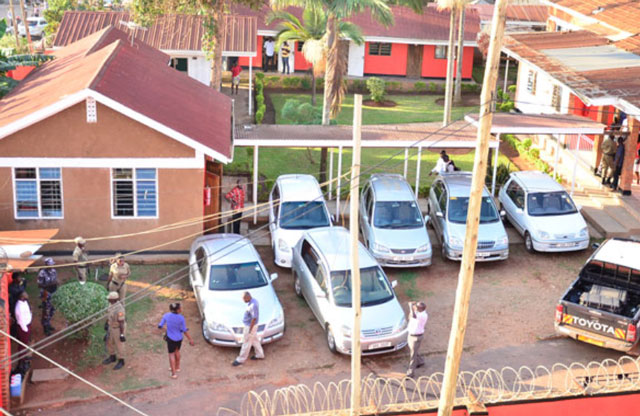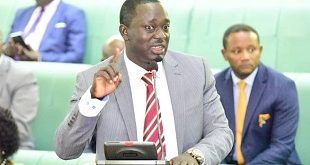
Latest on motive of raids on NGOs by security forces
Kampala, Uganda | FLAVIA NASSAKA | Usually on Friday, staff at the Uganda National NGO Forum; an umbrella organisation for Civil Society across the country, clock off early as the office closes at 1pm. But on Sept.13 by 4 O’clock some of them were literally running up and down the steep stairs to and from the director’s office.
In his office, Richard Sewakiryanga, the forum’s Executive Director sat among piles of books, files and papers – some flying in the air breezing from the wide open windows. Even before he spoke of a couple of meetings including a Skype call lined up after the interview, a sense of urgency was easily read on his face. He had just received confirmation that officials of the National Bureau for Non-Governmental Organisations (NGO Bureau), a government agency that oversees the NGO sector, had agreed to meet with him regarding a letter Sewakiryanga had received from them earlier in the week demanding he submits to them up to 17 audit documents.
The NGO Bureau asked Sewakiryanga’s NGO and 14 other partner organisations to submit their half year performance report of 2017, audited accounts from 2014 to 2016, financial and management reports, annual reports, Certified copies of bank statements from 2014 to Sept 2017, Certificates of incorporations, work plans, strategic plans from 2014 to 2016, governing documents, and a list of all directors, among others.
“They want all these in just one week,” Sewakiryanga told The Independent.
Sewakiryanga’s apprehension and frustration is shared by colleagues who have recently suffered the wrath of the police. On Oct.06, when The Independent spoke to Leonard Okello, the director of Uhuru Institute, he was equally wondering why the police had not yet released his five laptops, one desktop computer, and fifteen mobile phones they took when they swooped on his offices in the Naguru Kampala City suburb on Oct.02. His Data Assistant, Francis Lulahali, who had been arrested that day, was released the following day at night without preferring any charge against him.
“We have nothing to hide, let them take their time and check,” Okello says and adds that the security siege surprised him. The search warrant showed the institution which focuses mainly on training different groups in business planning and management was suspected to be engaging in illegal money transfers.
The raid on Uhuru Institute was just two weeks after Action Aid International Uganda located in Kansanga, and GLISS in Ntinda (owned by good governance activists Godber Tumushabe), and Solidarity Uganda in the Northern Uganda district of Lira were raided in a similar manner. Among others, the police said these were suspected of grave crimes, including involvement in illicit financial transactions and engaging in subversive activities to destabilise the country.
Motive of attacks
That week, Arthur Larok, the Action Aid Country Director warned colleagues who are members of the NGO Forum that they should prepare for a long drawn attack. He urged them to reflect on possible motives of the attack and think about what is likely to happen in the near future.
Without explanation, Sewakiryanga is left to wonder why Bank of Uganda had frozen accounts of his member organisation – Action Aid in Standard Charted Bank. Neither had he received a report from the police or any other body explaining a recent cordon and search swoop by security forces on Action Aid and three other NGOs; the Great Lakes Institute for Strategic Studies (GLiSS), Uhuru Institute for Social Development in Kampala, and Solidarity Uganda in northern Uganda.
“I’ve written to the minister (Internal Affairs Minister) three letters trying to meet with him on different occasions. There hasn’t been any feedback,” Sewakiryanga said.
Referring to the NGO Bureau, he said, “They have agreed to meet us on Monday. It’s then that we will know for sure what their motive is”.
For now, Sewakiryanga says, the government clampdown on NGOs is the latest sign that “the government is failing to accept the challenge of democratic life”.
“Diversity of opinion must thrive,” he adds. To him, instead of lashing at NGOs, the government needs to build a better relationship on how to work together on tough issues.
But Sydney Asubo, the Executive Director Financial Intelligence Authority, sees nothing strange about the recent government move against NGOs. He speaks with conviction about how routine it is for NGOs to be called to account since, under the law, they are supposed to report their source of funding to the government. The law also demands that banks alert the government or other investigative authorities of any suspicious transactions and large cash movements by NGOs, individuals or any other entity.
“When investigations are done people have to be inconvenienced,” he told The Independent, “but if NGOs feel these searches are not in good faith they could sue for malicious prosecution. “But that is one case that is not easy to prove”.
 The Independent Uganda: You get the Truth we Pay the Price
The Independent Uganda: You get the Truth we Pay the Price


